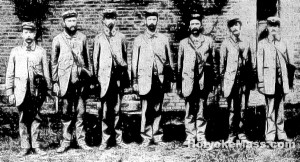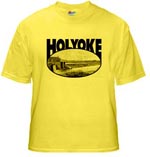by Laurel | March 19th, 2014
08 Mar 1931

Holyoke Letter Carriers, 1880-1900
Left to Right: George W. Gibson, Eli W. Beach, Edward W. Titus, William J. Judge, George W. Cook, William E. Webster, William A. Aiken.
(Click on image to view a larger size)
Six Men Performed This Service in the Eighties and Early Nineties
Hours Were Long and the Pay $600
Holyoke, March 7 — The emancipation of Uncle Sam’s employees from “pack mule” to the more highly respectable position of letter carrier is a transformation obtained during the memory of men now living. Holyoke during the 1880’s and 1890’s boasted of sic letter carriers and a substitute carrier. Of this number five are alive today, as is the substitute carrier. The delivery of mail in the city was intrusted to the seven men pictured in the above photograph. They are George W. Gibson, Eli W. Beach, Edward W. Titus, William j. Judge, George W. Cook, William E. Webster and substitute carrier William A. Aiken.
Long Day and Hard Work
These men were appointed yearly to their positions, the civil service commission at that time being nonexistent. George W. Cook, who covered an area now taken care of by three men, recalls “the good old days” as the days when men were men and the toter of the mail sack vied for honor with the 20-mule borax teams. Says Mr. Cook: “The hours of service counted for little. You went to work at 6:15 in the morning and made your three trips daily. When the third trip was completed your day ended and not until then,”
Covered Populous Section
Mr. Cook’s route was from Front Street to School Street and from Dwight Street to the river. When one considers that particular section was the populated part of the city in the late 1880’s and the early 1890’s, this particular job was not an enviable one. To be sure, the mail order houses had not concentrated on circular advertising and the magazines had not reached the circulation and method of distribution that attains today; nevertheless the route was a hard one and no job for a weakling. Orders were that all mail must be carried until delivered. This applied to papers as well, and there was no such thing as checking a bundle of papers with a friendly storekeeper until the carrier was in a better position to handle them.
Civil Service Helps
The civil service did much to change the working conditions of Uncle Sam’s employees. They decided upon an eight-hour day, for one thing, and later regulated the salary to make it nearer commensurate with American ideals. Mr. Cook received the salary of $600 a year while working some 11 or 12 hours a day and carrying mail sacks weighing more than 100 pounds. In time this was changed to $800 and later increased brought about through civil service and organization of the employees made the salary more enticing. At the institution of the eight hour day thee were some cities, Holyoke among them, that held that the job was a seven day job and, to offset the time lost by the elimination of Sunday as a working day, the men were required to work nine hours a day despite the eight hour law. In time this was adjusted and every hour worked by the employees overtime was paid for by the government. In some cases in the local post office this amounted to $500, a royal sum of money in those days.
The march of business, with its ever changing methods and systems, has made for specialization in most office work, and so we have parcel post, airmail and special delivery branches of the service. Where Holyoke had six carriers and a substitute in 1882, it has today 49. The district, however, comprised South Hadley and part of Willimansett.
Adapted from The Springfield Republican.








